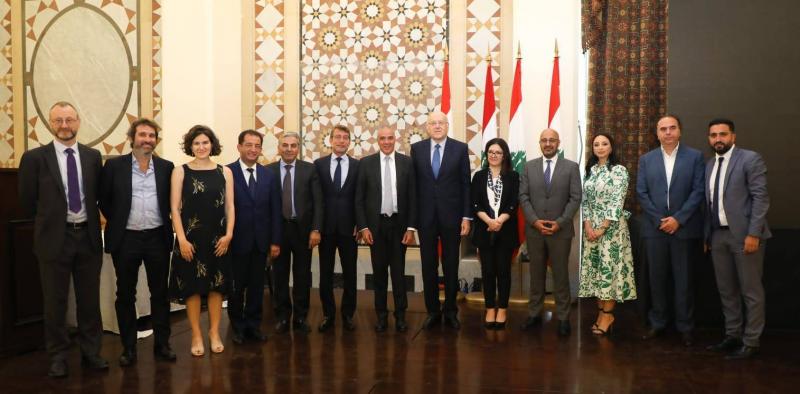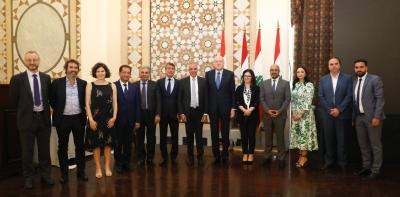The caretaker Prime Minister Najib Mikati confirmed that "we have no choice but to say that we will continue or not continue with what we are doing, and we must always show that the government is present and we are following all matters in cooperation with ministers and political figures." He stressed the "necessity of working on a national level to purify the political environment and that we all participate in the necessary reforms required to save this nation." Mikati was speaking at the Grand Serail during the announcement of an agreement between the European Union and UNICEF, in partnership with the Ministries of Energy, Water, and Environment, for a new project aimed at sustaining wastewater treatment services in Lebanon, which will reactivate 11 main wastewater treatment plants in the country.
In his speech, Mikati stated: "On this day, which we celebrate as 'World Environment Day,' we shine a light on a painful reality that our country suffers from due to the accumulation of environmental crises over years and the lack of capabilities that allow for fundamental treatment." He also addressed the cholera outbreak in Lebanon and UNICEF's role in delivering clean water, especially to remote villages.
The Minister of Energy, Walid Fayad, pointed to the administrative and financial obstacles that hindered the project's completion, while confirming that the support provided by the European Union and UNICEF to water institutions will gradually allow these institutions to manage the sector as stipulated in the water law. Fayad expressed hope for an extension of this grant for three additional years, which would significantly contribute to the success of the water sector recovery plan by 2026.
The Minister of Environment, Nasser Yassin, emphasized the continuation of "uncontrolled discharges from pollution sources," which leads to a decline in water quality in rivers, springs, wetlands, aquifers, and the sea, as many of these systems receive "pollutant loads exceeding their carrying capacities." He stressed the importance of the public and private sectors' commitment to the environmental guarantees issued by the Ministry of Environment (strategic environmental assessment, environmental impact assessment, environmental audit, etc.), particularly with regard to the values currently being amended concerning wastewater discharge.
The European Union Ambassador to Lebanon, Ralph Tarraf, announced: "This project today has benefits that extend beyond wastewater management. The continued operation of wastewater facilities, along with proper wastewater treatment, is fundamental to maintaining public health and social and economic development. By ensuring the treatment of wastewater, we mitigate the risks of waterborne diseases and protect the health and well-being of citizens. Therefore, this funding is both an investment in people's health and quality of life, as well as an important investment in the country's economic recovery."
For her part, UNICEF Deputy Representative in Lebanon, Eti Higgins, explained: "The inadequate operation and maintenance of wastewater treatment plants and the random discharge of untreated wastewater pose significant risks to the environment and public health. The recent cholera outbreak reminds us of the dangers arising from environmental pollution due to untreated wastewater." She concluded by affirming: "Together with the European Union, we are committed to enhancing the capacities of water institutions to ensure equitable and sustainable wastewater services for all, with the aim of reducing the spread of epidemics and saving lives."
In government activity, Prime Minister Mikati received an Australian delegation headed by Assistant Australian Foreign Minister Tim Watts, in the presence of the Australian Ambassador to Lebanon, Andrew Barnes, and President Mikati's advisors, Ambassador Botros Assaker and Ziad Mikati. The meeting discussed strengthening bilateral relations between Lebanon and Australia, as well as the economic and financial reform plan being undertaken by the government. The delegation appreciated the "efforts of the Lebanese government" and called for "expediting the election of a president, as it is essential for Lebanon."
Mikati also received a delegation from the team responsible for rehabilitating the experimental theater in the Rashid Karami International Exhibition, which includes engineer Waseem Nagi, Joelle Hajar, and Maestro Harout Vazzlyan. Engineer Nagi announced after the meeting: "We visited President Mikati as a team responsible for promoting the idea and working to achieve it, which concerns the rehabilitation of the experimental theater at the Rashid Karami International Museum, where the theater will be comprehensively rehabilitated without any costly additions, making it ready for operation as the largest theater in the city of Tripoli, with approximately 1,052 seats, and a stage area of about 300 square meters. It is unique in Lebanon and the region and will host activities from the end of this year and throughout 2024 as part of 'Tripoli, Capital of Arab Culture' events. His Excellency Prime Minister Mikati expressed his full support for this idea."




